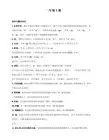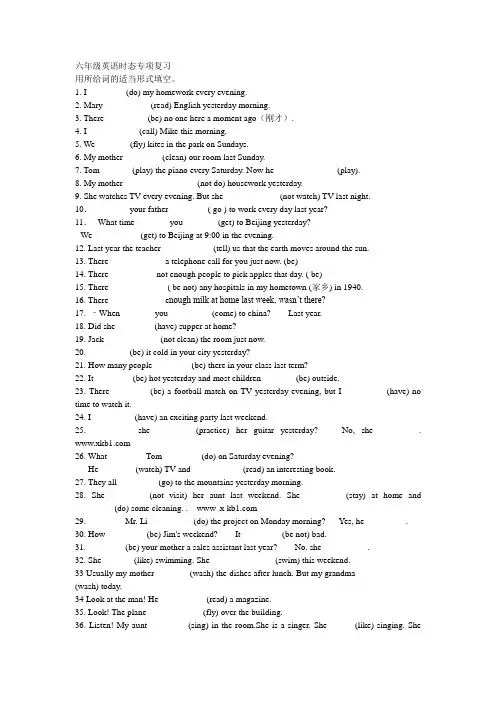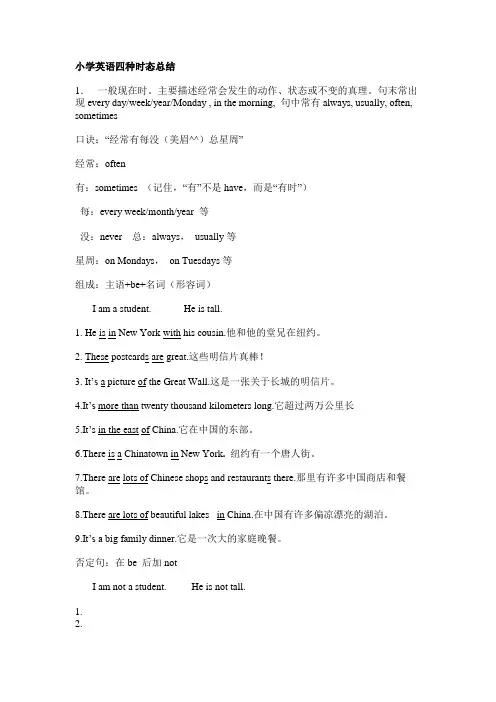PEP六年级英语时态复习总结
六年级下册英语-小升初总复习-时态全解-人教版PEP(共29张PPT)

将来时理论
一、 概念:表示将要发生的动作或存在的状态及打算、 计划或准备做某事。 句中一般有以下时间状语: tomorrow, next day(week, month, year…),
soon, the day after tomorrow(后天) this morning , this afternoon , this evening等。
试题演练:
三、 选择正确的答案。 B presents for my parents yesterday. 1. I ____ A. buyed B. bought C. buying C 2. Susan _____ swimming yesterday. A. go B. goes C. went B 3. Danny _____ breakfast five times last week. A. eat B. ate C. eated C Tree Planting Day. 4. Last Sunday____ A. is B. were C. was
试题演练:
一、写出下列动词的过去式或动词原形。 went was 1. go_______ 2. is___________ Lorem ipsum dolor bought 3.buy_______ 5. have had ____
sit amet, consectetur adipisicing elit, sed do eiusmod tempor incididunt ut labore
swam 4.swim__________
6. watched watch _____
eat 7. ate______
get 8. got__________
PEP六年级英语下册小学时态总复习

②实义动词: 肯定句:主语 + 动词过去式 +其它. I watched TV last night.
否定句:主语+ didn't +动词原形 +其它. I didn't watch TV last night. 一般疑问句:Did +主语+动词原形+其他? Did you watch TV last night?
my mother
read books
every morning
My mother reads books every morning. My mother doesn't read books every morning. Does your mother read books every morning?
5. He often ____(have) dinner at home. has 6. John and Mike ___(be) in Class One. are
7. We don't _________(not watch) TV on watch
Monday.
8. Nick doesn't ________(not go) to the zoo go
on Sunday. 9. ____ they ___(like) the World Cup? Do like
10. ______ your parents _______(read) Do read
newspapers every day? 11. The girl _________(teach) us English teaches on Sundays. 12. She and I ________(go) for a walk go
PEP六年级上册英语时态专项复习

六年级英语时态专项复习用所给词的适当形式填空。
1. I ________ (do) my homework every evening.2. Mary __________ (read) English yesterday morning.3. There _________ (be) no one here a moment ago(刚才).4. I ___________ (call) Mike this morning.5. We _______ (fly) kites in the park on Sundays.6. My mother ________ (clean) our room last Sunday.7. Tom _______(play) the piano every Saturday. Now he______________ (play).8. My mother ________________ (not do) housework yesterday.9. She watches TV every evening. But she ____________ (not watch) TV last night.10.________ your father ________ ( go ) to work every day last year?11.--What time _______ you _______ (get) to Beijing yesterday?--We __________ (get) to Beijing at 9:00 in the evening.12. Last year the teacher ___________ (tell) us that the earth moves around the sun.13. There ____________ a telephone call for you just now. (be)14. There __________ not enough people to pick apples that day. ( be)15. There _____________( be not) any hospitals in my hometown (家乡) in 1940.16. There ____________ e nough milk at home last week, wasn’t there?17. –When _______ you _________ (come) to china?Last year.18. Did she ________ (have) supper at home?19. Jack ____________ (not clean) the room just now.20. _________ (be) it cold in your city yesterday?21. How many people ________ (be) there in your class last term?22. It ________ (be) hot yesterday and most children _______ (be) outside.23. There ________ (be) a football match on TV yesterday evening, but I _________ (have) no time to watch it.24. I _________ (have) an exciting party last weekend.25. _________ she _________(practice) her guitar yesterday?No, she _________. 26. What ________ Tom ________ (do) on Saturday evening?He ________(watch) TV and__________(read) an interesting book.27. They all _________(go) to the mountains yesterday morning.28. She _________(not visit) her aunt last weekend. She ________ (stay) at home and _________(do) some cleaning. . www .x 29. ________ Mr. Li __________(do) the project on Monday morning?Yes, he _________.30. How _________(be) Jim's weekend?It _________(be not) bad.31. ________ (be) your mother a sales assistant last year?No. she __________.32. She _______(like) swimming. She ______________ (swim) this weekend.33 Usually my mother _______ (wash) the dishes after lunch. But my grandma_______________ (wash) today.34 Look at the man! He __________ (read) a magazine.35. Look! The plane ____________ (fly) over the building.36. Listen! My aunt ________ (sing) in the room.She is a singer. She _____ (like) singing. She____ ___(have) a music show next month. She is excited.37. Tom and Mike always ______ (swim) in the river. They _____ (swim) in the swimming pool this Sunday. Look! They ______ (swim).38. What ______ you usually ______ (do) in the evening? I _______ (play) computer games.39. What _______ you _______ (do) now? I _______ (make) a paper plane.40. What _______ he _______ (do) now? He ______________ (dance).41. What _______ she ______ (do) yesterday?She _________ (visit) her grandparents.42. ______ your mother ______ (read) newspaper in the morning?Yes, She ________ .43. _______ you _______ (like) fishing? No, I ______ . I like ______ (swim),but my brother ______ (like).44. How ______ your father _______ (go) to work every day?He ______ (go) by bike. But it’s cold today. He ______ (take) the No.21 bus,, and he _______ (go) to work by taxi yesterday.45. _______ the monkey _______ (like) climbing trees? Yes, it _______ .46. What _______ your father ______ (do) after lunch? He _______ (read) a comic book. What _____ he _______(do) today? He _______ (clean) the kitchen for my grandma. Look! He (clean).47. ________ you ______ (collect) stamps? Yes. I _______ .________ your brother ______ (collect), too? No, he ________ .。
人教版pep小学英语六年级上册易错题时态、三单、ing

pep小学英语六年级上册易错题时态、三单、ing时态易错题一、一般现在时:主语+动词原形或动词三单+多次发生的时间(如频度副词always usually often sometimes on Mondays) 动词原形变三单规则:1.一般情况下直接加s。
2.以s/x/ch/sh/o结尾的动词加es。
3.以元音字母+y结尾的动词直接加s。
(元音字母有a/e/i/o/u)以辅音字母+y结尾的动词变y为i加es。
4.以f/fe结尾的动词变f/fe为v加es。
(仅了解)5.特殊:have的三单是has二、现在进行时:主语+be+动词ing+表示现在的时间(如now,look,listen)动词原形变动词ing的规则:1、一般情况直接加ing。
2、以不发音的e结尾的去e加ing。
3、双写最后一个辅音字母加ing:run-running,swim-swimming,shop-shopping,get-getting,sit-sitting,cut-cutting,win-winning三、一般将来时:主语+be going to +动词原形+将来时间主语+will+动词原形+将来时间(如tomorrow /this morning/this... /next week/next.../one day )一、写出下列单词的第三人称单数及动词ing形式。
1、buy _______ ________2、clean_______ ________3、help_______ ________4、find_______ ________5、pass_______ ________6、try_______ ________7、get_______ ________8、come_______ ________9、fly_______ ________10、love_______ ________11、eat_______ ________12、pack_______ ________13、wait_______ ________14、speak_______ ________15、finish_______ ________16、wash_______ ________17、watch_______ ________18、do_______ ________ 19、read_______ ________20、play_______ ________21、sing_______ ________22、dance_______ ________23、draw_______ ________24、cook _______ ________25、swim_______ ________26、learn_______ ________27、study_______ ________28、want _______ ________29、send_______ ________30、live_______ ________31、have_______ ________32、take_______ ________33、make_______ ________34、start_______ ________35、late_______ ________36、need_______ ________37、win_______ ________38、pick_______ ________39、meet_______ ________40、plant_______ ________41、look_______ ________42、climb_______ ________43、jump_______ ________44、drink_______ ________45、sleep_______ ________46、listen_______ ________47、talk_______ ________48、like_______ ________49、say_______ ________50、teach_______ ________51、catch_______ ________52、see_______ ________53、ask_______ ________54、give_______ ________55、tell_______ ________56、wear_______ ________57、visit_______ ________ 58、join_______ ________59、share_______ ________60、use_______ ________61、type_______ ________62、chase_______ ________63、hurt_______ ________64、hear_______ ________65、worry_______ ________一般现在时一、用单词的正确形式填空:1.Mike _________ (do) his homework every day.2.He _________ (like) swimming.3.We like ________ (play) basketball after class.4.I like singing. I often _________(listen) to the music in the evening.5.My grandma_________(watch) TV every day.二.单选1. ____Alice often play the piano?No, she _____.A.Do; doB. Does; doesC. Does; doesn’t2. ___ your pen pal _____ in Beijing?A. Do; liveB. Do; livesC. Does; live3. Tom and Mike_________very excited, they will take a trip.A. isB. areC. am4. I like ________ very much. What about you?A. danceB. dancedC. dancing5. Bill and I ___ good friends.A. isB. areC. am6. Sandy often ___ his homework on Sundays .A. doB. doesC. did7. What do you usually do on the weekend?I __________.A. went swimmingB. go swimmingC. visited grandparents8. What do you usually do on your holiday?A. saw elephantsB. sing and danceC.took pictures9. I ____ a student. I go to school ____bus every day.A. is; byB. am; onC. am; by现在进行时一、填空。
人教版(PEP)六年级下册英语四种时态复习

人教版六年级英语四种时态复习四种时态复习一般现在时的基本概念一般现在时表示现在经常反复发生的动作、存在的状态或习惯性的动作的时态。
常见的标志词(时间状语)主要有:every…, sometimes, at…, on Sundays, uauslly often, never, always等。
一般现在时的结构be动词的一般现在时主语+ Be动词+ 其他成分I am a boy.实义动词的一般现在时主语+ 行为动词+ 其他成分We study English.一般现在时的具体形式be动词的一般现在时1.第一人称单数I+amI am a student.2. 第二人称单数you和其他人称复数we/you/they+areYou are a lucky girl.We are students in this school.3. 第三人称单数he/she/it+isShe is my teacher.例题:用be动词的适当形式填空。
1. I from China.2. It very hot today.3. They in the hospital.4. We good students.5. She a beautiful girl.实义动词的一般现在时1.第一、二人称单数I/you和其他人称复数we/you/they+动词原形I get up at 8 o’clock.They go to school everyday.2.第三人称单数he/she/it+实义动词第三人称单数形式It runs fast.He studies hard.例题:用说给单词的适当形式填空。
1. We home every day.(go)2. Trees green in spring.(turn)3. He very hard.(study)4. The boy up at seven O'clock.(get)5. The earth round the sun.(move)补充:主语为第三人称单数形式,谓语动词的变化规则:一般现在时的句型变化be动词的一般现在时肯定句否定句He is a worker. 主语+ be动词+ not + 其他He is not a worker.一般疑问句特殊疑问句Be动词+ 主语+ 其他特殊疑问词+ 一般疑问句-Is he a worker?Where is he?-Yes, he is. / No, he is not.例题:写出下列句子中所缺的be动词,并用肯定及否定形式回答。
小学英语 六年级四种时态总结

小学英语四种时态总结1.一般现在时。
主要描述经常会发生的动作、状态或不变的真理。
句末常出现every day/week/year/Monday , in the morning, 句中常有always, usually, often, sometimes口诀:“经常有每没(美眉^^)总星周”经常:often有:sometimes (记住,“有”不是have,而是“有时”)每:every week/month/year 等没:never 总:always,usually等星周:on Mondays,on Tuesdays等组成:主语+be+名词(形容词)I am a student. He is tall.1. He is in New York with his cousin.他和他的堂兄在纽约。
2. These postcards are great.这些明信片真棒!3. It’s a picture of the Great Wall.这是一张关于长城的明信片。
4.It’s more than twenty thousand kilometers long.它超过两万公里长5.It’s in the east of China.它在中国的东部。
6.There is a Chinatown in New York.纽约有一个唐人街。
7.There are lots of Chinese shops and restaurants there.那里有许多中国商店和餐馆。
8.There are lots of beautiful lakes in China.在中国有许多偏凉漂亮的湖泊。
9.It’s a big family dinner.它是一次大的家庭晚餐。
否定句:在be 后加notI am not a student. He is not tall.1.2.3.4.5.6.7.8.9.疑问句:be 动词提前到第一位。
六年级英语总复习(时态-语法)
六年级英语总复习(时态,语法)(一)一般现在时1、概念:表示经常性或习惯性发生的动作。
2、标志词:often, usually, sometimes, always, every day等3、主语是第三人称单数he, she, it 时,谓语动词要加s或es,其他人称动词要用原形。
4、主语是第三人称单数时,动词变化规则:A、一般情况,在动词后面直接加s,如:walk-walks.B、以sh, ch, o结尾的,在动词后面加es,如:wash-washes,watch-watches, go--goesC、以辅音加y结尾,将y改为i,再加es,如:study-studies.(二)现在进行时:1、概念:表示正在发生的事情或动作。
2、标志词:now, look, listen , it’s……3、结构:b e(am, is , are)+动词ing4、动词加的规则如下:A、一般情况下,在动词后面直接加ing,如:listen-listeningB、以不发音的e结尾,去e加ing,如:take-taking (make, like, write , come)C、以重读闭音节(辅音+元音+辅音)结尾的,要双写最后一个字母再加ing,如put-putting, (get, sit, stop , run, swim, set)但:see-seeing, eat –eating.(三)一般将来时:1、概念:表示将要发生的事或打算,计划要做的事。
2、标志词:this weekend, next Monday, tomorrow, in seven years’ time3、结构:be(am, is , are) going to +动词原形或者 Will+动词原形如:I am going to take a trip next week.4、否定句:be+not going to +动词原形或者 Will+not(等于won’t)+动词原形(四)一般过去时:1、概念:表示在过去的时间里所发生的事或动作。
pep六年级英语时态复习
fall– fell , can – could ,sit – sat ,hurt – hurt , run----ran
drink – drank ,fly--flew
一、找 — 时间关键词 二、定 — 根据关键词定时态
三、想 — 所定时态的构成方式
Daily exercise(用所给动词的适当形式填空)
(
) 1、Can he ____fast? A. swimming B. swims
C. swim
(
) 2、A: What are the boys doing? B: They ________. A. play basketball B. playing basketball C. are playing basketball
你将怎样去呢? How are you going? I’m going by bus.
今天下午你将要去哪里? Where are you going this afternoon? I’m going to the bookstore. 你将要买什么呢? What are you going to buy? I’m going to buy a comic book. 你将和谁一起去? Who are you going with? I’m going with my parents.
4.句中出现情态动词时,该句中动词用原型。如: He can play basketball well. Could you play the pipa last year? Amy couldn’t ride the bike 10 years ago. shall, should, must, have to, want to Dad and I wanted to make her happy. 5.祈使句中动词用原型,如: Let’s go shopping .
pep六年级下册英语知识点归纳总结
pep六年级下册英语知识点归纳总结一、单词拼写常见规律:1. 以e结尾的单词,变成复数形式时,先去掉e再加s;2. 以辅音字母+y结尾的单词,变成复数形式时,先把y变i再加es;3. 以o结尾的单词,变复数形式时,大部分直接加es。
二、基数词和序数词1. 基数词:表示数量的词,例如:one, two, three等;2. 序数词:表示顺序的词,例如:first, second, third等。
三、时态1. 一般现在时:表示经常发生的动作或客观事实;2. 一般过去时:表示过去发生的动作或状态;3. 一般将来时:表示将来发生的动作或计划。
四、句型结构1. 肯定句结构:主语+动词+宾语;2. 否定句结构:主语+do/does/did not+动词+宾语;3. 疑问句结构:特殊疑问词/助动词+主语+动词+宾语。
五、情态动词常见情态动词有can, could, may, might, must, shall, should, will, would等,它们用于表示推测、能力、许可、建议、命令等情态。
六、名词所有格1. 名词所有格:表示所属关系的名词后面加's;2. 表示复数名词所有格:在复数名词后面加';3. 表示以s结尾的复数名词所有格:在复数名词后面加'。
七、形容词和副词1. 形容词:修饰名词,通常放在名词前面;2. 副词:修饰动词、形容词和副词,通常放在所修饰的词后面。
八、比较级和最高级1. 比较级:表示两个或两组人或事物之间的比较,形容词和副词的比较级一般在词尾加er,例如:taller, faster;2. 最高级:表示三个或三组或三者以上的人或事物之间的比较,形容词和副词的最高级一般在词尾加est,例如:tallest, fastest。
九、倍数和分数1. 倍数:使用倍数词+as+形容词原级,例如:twice as heavy as;2. 分数:使用分数词+of+名词,例如:two-thirds of the students。
四大时态按要求完成句子训练(讲义)人教PEP版英语六年级下册
人教版PEP六年级复习之四大时态、按要求完成句子训练Part A ——动词的时态之每天昨天今天和明天一般现在时1.一般现在时简介:主要描述经常会发生的动作、状态或不变的真理。
句中常出现____________________________________________________________________等.2.一般现在时的组成形式:主语+be+名词(形容词)I am a student.He is tall.We are friends.主语+动词原形+其它We go to school on Monday.He goes to school at seven in the morning.3.主语+情态动词can+动词原形+其它。
如:Tom can speak Chinese. A bird can fly.现在进行时1.现在进行时简介: 表示目前或目前阶段正在进行的动作。
句中常出现____________________________等.2.现在进行时的结构:人称+ _______________ + _______________一般将来时1.一般将来时简介:主要描述将来要发生的事情。
句中常出现______________________________________等.2.一般将来时的组成形式:主语+ _______________+动词原形主语+ _______________+动词原形★be going to = willI am going to go swimming tomorrow=I will go swimming tomorrow.一般过去时1.一般过去式简介: 表示过去某一时间发生的动作或存在的状态。
常和yesterday,last week(year),three days(weeks) ago,in 2003等时间状语连用2.一般过去式的组成形式:主语+be动词(was,were)+其它。
- 1、下载文档前请自行甄别文档内容的完整性,平台不提供额外的编辑、内容补充、找答案等附加服务。
- 2、"仅部分预览"的文档,不可在线预览部分如存在完整性等问题,可反馈申请退款(可完整预览的文档不适用该条件!)。
- 3、如文档侵犯您的权益,请联系客服反馈,我们会尽快为您处理(人工客服工作时间:9:00-18:30)。
5. 第三人称单数主语包括:he; she; it; my father/friend Amy/Hangzhou等一个人名或地名。 例如: He likes drawing pictures. She works in a factory. It has a long nose. My father goes to work on foot. Li Lei often plays computer games after lunch.
定义:表示现在的状态,经常的或习惯性的动作。
时间关键词: usually/ sometimes/often / always/ every词组/ 构成方式:①非三单+动词原形 ②三单+动词单三
1. 一般情况加s,如: read—reads;live—lives;play—plays;sing—sings 2. 动词末尾以s,x,ch,sh或部分以o结尾的加es。 watches, teaches, goes, does, washes 3. 辅音字母+y结尾的把y变i再加es,如: fly—flies;study—studies 4. 特殊情况:have—has
Ⅱ. 汉译英,每空一词。 1. 我正在看电视。 am _______________ watching TV. I ______ 2. 刘涛的父亲正在浇花。 Liu Tao’s father _______ ____________ flowers __________. is watering 3. 孩子们正在操场上踢足球. The children _______ _______ are playing _______ football in the playground.
play——played
不规则动词(此类词并无规则,须熟记)
sing – sang , eat – ate ,see – saw , have – had , do – did ,
go – went , take – took , buy – bought , get – got , read – read , fly – flew , am/is – was ,are – were , make – made ,
6. 一般疑问句记住: 前面助动词加了es,后面动词就不变化了。例如: Does she do word puzzles every day? Does your pen pal live in Hangzhou?
定义:表示将来发生的动作或情况。 时间关键词:tomorrow/ next等
构成方式:主语+be going to +动词原形
选择填空。 ( C )1. We are going to _______ kites.
A. flies
A. be
B. flying
B. is
C. fly
C. am
( A )2. I am going to _______ a teacher.
时
态
构
成 形
式
现在进行时 主语+be+动-ing(现在分词)
swim—swimming
Байду номын сангаас
主要问答句
你正在干什么? What are you doing? I’m answering the phone.
他/她/它正在干什么? What is he/she/it doing? He’s/She’s/It’s …
他(她、它)们正在干什么? What are they doing? They are …
pep小学英语 时态总结
定义:表示现在正在发生的事情。
时间关键词:now/ Listen!/ Look! 构成方式:主语+be+动-ing
1. 直接加ing: do—doing draw—drawing cook—cooking read—reading listen—listening fly—flying sing—singing play—playing
2. 去掉末尾的e加ing: write—writing dance—dancing have—having make—making
take—taking ride—riding
3. 双写末尾字母ing : get—getting run—running sit—sitting put—putting
你将怎样去呢? How are you going? I’m going by bus.
今天下午你将要去哪里? Where are you going this afternoon? I’m going to the bookstore. 你将要买什么呢? What are you going to buy? I’m going to buy a comic book. 你将和谁一起去? Who are you going with? I’m going with my parents.
一般现在时 ①非三单+动词原形 ②三单+动词第三人称单数形式 一般将来时 主语+be going to +动词原形
动词的过去式的构成规则有:
1.直接加ed: work—— worked ,look——looked ,play——played, 2.以e结尾的单词,直接加d:live ——lived use——used, 3.以辅音字母+y结尾的,变y为i加ed:study—— studied
表示一般将来时的时间状语有:
this morning, this afternoon, this evening, tomorrow, tonight, this weekend, next week, next month, next year, next weekend. 主要问答句 (今晚)你将要做什么? What are you going to do (this evening)? I’m going to visit my grandparents. 你将什么时候去? When are you going? I’m going at 7:10.
